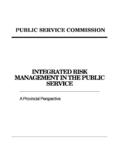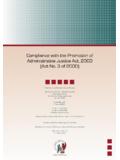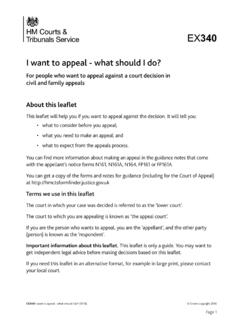Transcription of GUIDELINES TO FOLLOW WHEN CONSIDERING THE …
1 GUIDELINES TO FOLLOW when CONSIDERING THE MERITS OF AN appeal IN A CASE OF MISCONDUCT 2001 TABLE OF CONTENTS 1. INTRODUCTION ..1 2. STEPS TO BE TAKEN BEFORE DELIBERATING ON THE MERITS OF AN 3. DELIBERATING ON THE MERITS OF AN appeal ..3 4. SUGGESTED FORMAT TO ASSIST THE appeal AUTHORITY TO TAKE A 5. REFERENCE TO LEGISLATION AND CASE LAW ..16 1. INTRODUCTION Appeals in cases of misconduct, have until 30 June 1999, been handled by the Public Service Commission in terms of section 26 of the Public Service Act, 1994. In terms of section 10 of the Public Service Laws Amendment Act, 1998, the whole of Chapter VI (Inefficiency and Misconduct) of the Public Service Act, 1994, has been repealed.
2 This means that the provisions of sections 20 to 27 of the Public Service Act, 1994, have fallen away. A collective agreement on a new Disciplinary Code and Procedures for the Public Service as agreed upon in the Public Service Co-ordinating Bargaining Council, was reached and signed on 29 January 1999, and has come into effect on 1 July 1999. In terms of clause 8(3) of the new Disciplinary Code and Procedures for the Public Service - The appeal authority, who shall consider the appeal , shall be: a. the executing authority of the employee, or b. an employee appointed by the executing authority, who i. was not involved in the decision to institute the disciplinary proceeding, and ii who has a higher grade than the chair of the disciplinary hearing.
3 In view of the fact that the Commission has until 30 June 1999 handled all appeals in cases of misconduct, the Commission has thought it prudent, due to its expertise, to draft a Manual containing GUIDELINES on the handling of appeals in cases of misconduct, for possible use by the appeal authorities. 2. STEPS TO BE TAKEN BEFORE DELIBERATING ON THE MERITS OF AN appeal Determine whether the appeal has been lodged within the prescribed 5 day period. In terms of the new Disciplinary Code and Procedures for the Public Service, an employee who has been found guilty of misconduct, may lodge an appeal against a finding of guilty or the imposition of punishment by the chair who conducted the disciplinary hearing, within five (5) working days after having received notice of the outcome of the hearing or other disciplinary procedure referred to in clause 5 of the new Disciplinary Code and Procedures for the Public Service.
4 In CONSIDERING such an appeal , it is imperative to determine whether the appeal has been lodged within the prescribed 5 day period. In terms of the Interpretation Act, in order to calculate the number of days, the first day is excluded and the last day is included. Ensure that the following documentation and information are available: a. Biographical and service data of the employee. b. Notice of the disciplinary hearing. c. Appointment of chair of disciplinary hearing. d. Description of the allegations of misconduct (charge sheet). e. Description of the main evidence on which the employer relied. f. If the employee has been suspended or transferred, notice of such suspension or transfer.
5 G. Record of the proceedings of the hearing. h. Finding, and reasons for the finding of the chair. i. Aggravating or mitigating circumstances presented by the representative of the employer. j. Mitigating circumstances presented by the employee charged with misconduct. k. Aggravating and mitigating circumstances considered by the chair. l. Letter conveying the finding and the decision of the chair to the employee. It is extremely important that the employee should acknowledge receipt of the said letter. Evidence of the exact date that he/she received the letter should also be indicated. If the employee refuses to acknowledge receipt of the letter, evidence by other employees that the employee did receive the letter would suffice.
6 M. Any additional evidence presented by the employee that was not available at the time of the disciplinary proceedings. n. Any valid warnings on file, which should be taken into consideration as aggravating. o. All other documentation and particulars relevant to the case in question. Determine the grounds of appeal submitted by the employee. The appeal authority has the power to consider the merits of each case anew with or without additional information. This is what is commonly known as a wide appeal . If grounds of appeal are submitted they must be addressed and reasoned individually, against the procedural and substantive fairness of the case.
7 If no grounds of appeal are submitted, the appeal authority should consider the procedural and substantive fairness of the case. Determine mitigating and aggravating circumstances. These circumstances should be reasoned in order to determine whether they are substantiated or not, and whether they should be taken into consideration as such. 3. DELIBERATION ON THE MERITS OF AN appeal In terms of the provisions of paragraph 8 of the Disciplinary Code and Procedures for the Public Service an officer can appeal against the finding of guilty and/ or the sanction imposed by the chair of the disciplinary hearing. Paragraph of the Disciplinary Code and Procedures for the Public Service provides for the following sanctions which can be imposed by the chair of the disciplinary hearing: [i] counseling; [ii] a written warning; [iii] a final written warning; [iv] suspension without pay, for no longer than three months; [v] demotion; [vi] a combination of the above; or [vii] dismissal.
8 2. It is evident that there are a number of sanctions which can be imposed by the chair of the disciplinary hearing. Dismissal is undoubtedly the most severe of those sanctions. In terms of the concept of progressive discipline, it should always be the last resort for a chair of a disciplinary hearing, and should only be imposed in cases of serious misconduct, which does not warrant progressive discipline. 3. The merits of an appeal should always be considered by the appeal authority in terms of the principles of fair and sound labour relations. In this regard the Code of Good Practice: Dismissal, Schedule 8 of the Labour Relations Act, 1995 provides GUIDELINES to be followed in determining whether a disciplinary case was dealt with in terms of a fair procedure, and whether the sanction imposed by the chairperson of the disciplinary hearing is substantively fair, and suits the contravention.
9 Although the Code specifically refers to dismissal as a sanction, the principles provided, should be applied uniformly, no matter what the sanction. The principles of procedural and substantive fairness are accordingly reasoned below: Procedural fairness The following GUIDELINES may be followed in determining whether the procedure followed during the disciplinary case is fair: Paragraph 7 of the Disciplinary Code and Procedures for the Public Service provides for the procedure to be followed once a disciplinary enquiry is conducted. In CONSIDERING the appeal of an employee it is necessary that the appeal authority consider the merits of the appeal against the background of this procedure, and specifically whether this procedure was followed fairly.
10 The appeal authority should therefore determine whether the disciplinary case was dealt with in terms of the provisions of the above Code. Paragraph 4 of the Disciplinary Code and Procedures for the Public Service states that the Code of Good Practice as contained in Schedule 8 of the Labour Relations Act, 1995, insofar as it relates to discipline constitutes a part of the Disciplinary Code and Procedures for the Public Service. It is therefore, evident that these GUIDELINES should also be considered in determining the procedural fairness of a disciplinary case. Item 4 of Schedule 8 of the Labour Relations Act, 1995, provides the following GUIDELINES to determine the procedural fairness of an enquiry/ investigation into alleged misconduct: [i] The conducting of an investigation Although Item 4 of Schedule 8 of the Labour Relations Act, 1995 provides that an investigation/ enquiry should be conducted, it is not necessary that such investigation/ enquiry should be formal, but can be conducted informally.











